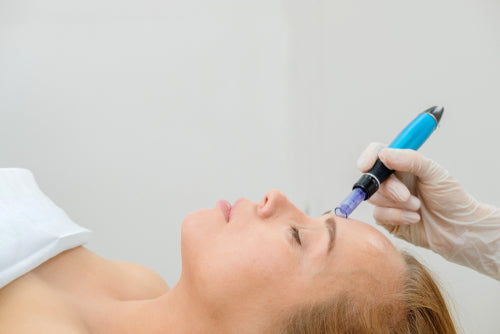
Does Microneedling Help Acne? - Microneedling for Scars
If you struggle with deep acne scars and pockmarks, you’ve probably tried every topical treatment, serum, and DIY mask to attempt to reduce the appearance of your acne scars. If you’ve looked into professional treatments by dermatologists or licensed aestheticians, you’ve most likely come across microneedling. You’ve seen the before-and-after pictures, but you might still be wondering if microneedling really helps acne scars?
Yes, microneedling really helps acne scars. The process promotes the growth of new collagen in your skin, encouraging your skin to heal itself, reducing the appearance of ice pick, boxcar, and rolling acne scars.
Let’s dive into the specifics about how you can reduce acne scars with microneedling.
How Microneedling Helps Acne Scars
Microneedling tools are comprised of small needles (most commonly penetrating 0.5mm–1mm) that gently puncture the skin and create small wounds. These wounds are nearly imperceptible, but your skin recognizes that it needs to heal itself so it produces more collagen. This increase in collagen production helps smooth out scars as well as fine lines and wrinkles.


Microneedling Results
Most patients see a noticeable reduction in acne scars after a few treatments. Deep scars or pockmarks are lessened and skin has a more even tone and texture in as few as three treatments. The new skin that’s created will be firmer, brighter, and smoother! Even those without acne scars will see an improvement in their skin’s appearance.
The recommended treatment cycle is one treatment every four to six weeks. Three to four treatments are recommended to see optimal results, with yearly follow-up treatments after that.
Microneedling Side Effects
Compared to other scar-reduction treatments, microneedling’s side effects are relatively minimal. You may experience some redness or inflammation, or even slight bruising. Avoiding excess sun exposure and drinking lots of water before and after your treatment can lessen the chance of experiencing side effects. Most people, however, will have minimal or no side effects and can return to their usual schedule within 24-hours of treatment.
Certain individuals should not undergo microneedling treatments. If you easily scar, have keloids, are pregnant, or have rosacea or eczema, talk with your dermatologist to decide if microneedling is right for you.

Professional vs At-Home Microneedling for Acne Scars
At-home dermarollers have increased in popularity over the past few years. Bloggers, beauty journalists, and Amazon reviewers have sung the praises of how a $20 roller brightened, firmed, and improved their skin. However, these at-home devices and their results differ greatly from professional microneedling treatments.
If you dermaroll your skin yourself, you greatly increase the potential to damage your skin. Even if you correctly do the procedure on yourself, you won’t see the same results as you would if it was done by a professional.
Microneedling for Acne Scars - FAQs
What is the success rate of microneedling for acne scars?
The success rate of microneedling for acne scars varies among individuals. Clinical studies suggest that many people experience noticeable improvement, but complete scar removal may not always be achieved. Factors such as the severity of scars, individual skin response, and the practitioner's expertise can influence outcomes.
Does microneedling help with dark spots from acne?
Yes, microneedling can be effective in reducing hyperpigmentation, including dark spots from acne. The controlled skin injury induced by microneedling promotes collagen production, which helps even out skin tone and reduce discoloration over time.
Does acne come back after microneedling?
Microneedling primarily addresses the appearance of acne scars and may have some positive effects on active acne. However, it does not treat the root cause of acne, and there is no guarantee that acne won't recur. Comprehensive skincare and treatments such are extraction facial often recommended for acne management. In addition to extractions, facials for acne treatment can involve a variety of additional treatments. You can find more information about these options here.
How many sessions of microneedling do I need for acne scars?
The number of microneedling sessions needed for acne scars varies based on individual skin condition and the severity of scars. Typically, a series of sessions spaced several weeks apart is recommended. Consult with a qualified dermatologist or skincare professional for a personalized assessment.
What is the best age for microneedling?
Microneedling is generally suitable for adults. It's often considered once the skin has fully developed, usually in the late teens or early twenties. Here at Skin Spa, our licensed estheticians use SkinPen®, the first microneedling device cleared by the US FDA. It delivers consistent, noticeable results for acne scars for individuals aged 22 and up.
What happens if you microneedle over acne?
Microneedling over active acne lesions is generally not recommended. It can spread bacteria and potentially worsen the condition. It's advisable to wait until the acne is under control before considering microneedling. Consult with a skincare professional for personalized advice based on your specific situation.
Conclusion
Professional microneedling is a proven method to reduce acne scars. If you're interested in experiencing the benefits, we invite you to contact Skin Spa at one of our nearest locations for a consultation or to schedule your first treatment. Take the step towards rejuvenated skin and discover the transformative results that professional microneedling can bring to your complexion.
